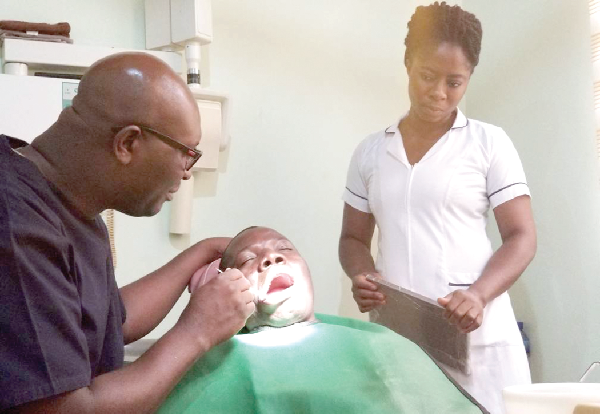
World Oral Health Day - Good smile is beauty to all
Smiling is seen by many as an involuntary response to things that bring you bliss or laughter.
While this observation is certainly true, what most people overlook is that smiling can be just as much a voluntary response as a conscious and powerful choice. That is, you decide whether to smile or not.
Science says a great smile always prevents pain and keeps the body flourishing.
This occurs when muscles of expression located around the mouth called depressors and levators are activated, sending signals to the brain.
Aside all the science, socially, a great smile is a sign of good things.
Oral cavity
One of the main hindrances to a great smile is diseases of the oral cavity (mouth).
These include Gum infection (Gingivitis), Infection of the supporting structures of the teeth (Periodontis), Tooth decay (Dental Caries), Bad breath (Halitosis), Malocccusions (improper arrangement of teeth), tumours, etc.
The good thing about most of these conditions is the fact that they are curable. Let’s look at a few of these conditions and how they can be treated.
Gum infection (Gingivitis) is an infection of the gum.
Basically, it is a form of gum disease that causes irritation, redness and swelling (inflammation) of your gum.
It's important to take gingivitis seriously and treat it promptly.
The gum gets infected because food films (plaque) get stacked on our teeth and in between them anytime we eat.
Inability to get rid of them after meals leads to its accumulation (plaque).
The bristles of our everyday brush cannot get them off. Mechanical debridement by a machine is what dentists use to get rid of them in a procedure called Scaling and Polishing.
It is the advice of every dentist that every individual necessarily does Scaling and Polishing twice every year. Also it’s important to brush at least twice daily. These can help prevent and reverse gingivitis.
Infection
Dental caries (cavities) is a multifactorial infectious disease where the structural components of the tooth are lost.
They are caused by a combination of factors, including bacteria in your mouth, frequent snacking, sipping sugary drinks and not cleaning your teeth well.
If cavities are not treated, they get larger and affect deeper layers of your teeth.
They can lead to a severe toothache, infection of the gum and bone, tooth loss and may even lead to death from long standing sequel.
Signs and symptoms of cavities vary, depending on their extent and location.
You may not be aware that a cavity is forming. That is why it is important to have regular dental check ups and cleanings, even when your mouth feels fine.
However, if you experience a toothache or mouth pain, see your dentist as soon as possible. Don’t wait till it becomes deeper and worse.
Do not self-medicate because self-medication simply means you are permitting the cavity to extend and get deeper, leading to more severe pain later: treatments such as regular filling and root canal treatments can be done by your dentist to save your tooth from extraction.
Bad breath
Halitosis (Bad breath) is a general term used to define an unpleasant or offensive odour emanating from the breath regardless of whether the odour originates from oral or non-oral sources.
Halitosis should not be confused with the general temporary oral odour caused by intake of certain foods, tobacco, or medications.
The most common cause of halitosis is bad oral hygiene. This leads to uncontrolled growth of oral bacteria known to produce volatile sulphur compounds. These compounds give the mouth its bad odour.
Other local causes include gum diseases, Xerostomia (reduced saliva flow), carious lesions or cavities (especially with food particles).
Bad breath may also be caused by general systemic disease of the respiratory system. Lastly, halitosis may have a psychological cause.
Treatment
The treatment of oral malodour consists of the elimination of the local cause present.
If underlying disease is suspected, the patient should be referred to the respective specialists.
Thorough plaque control to remove plaque and food particles is a daily necessity. Regular check up to correct problem areas; common oral diseases, faulty restorations, leaking crowns, all of which cause food trap, is a must.
Proper oral hygiene
Proper oral hygiene must be reinforced and professional oral prophylaxis (plaque removal through scaling and polishing) are essential.
Cleaning in between teeth is relatively more important because toothbrush bristles do not gain access to these areas.
Mouth rinse
Mouth rinses are valuable adjuncts but do not provide the best sole treatment.
Chlorhexidine is the mouth rinse that demonstrates considerable reduction of malodour.
The use of hydrogen peroxide rinse also offers positive perspectives. Mouth rinses are best used before bed time.
Most of all ensure good daily hydration and consult your dentist as regularly as possible.
All these conditions are treatable. Get a check up now.
Smiles are not just a way of expressing our joy or gladness.
They are also an insight into our general sense of cleanliness and wellbeing.
Today, the mask protects you from COVID and keeps your mouth, teeth and gums covered.
Treating them today does not only mean a brighter smile tomorrow, but also good health.
As we join the world to celebrate this day, Medifem Hospital’s Dental Clinic is organising free dental screening tomorrow.
The writer is a Dental Surgeon at the Medifem Multi-Specialist Hospital & Fertility Centre
